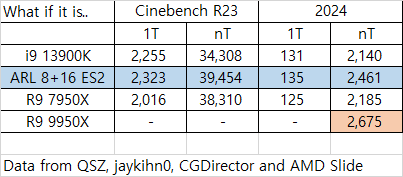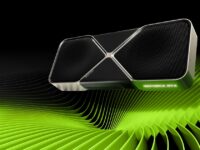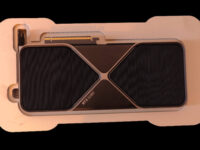
The Cinebench scores of Intel’s Arrow Lake-S flagship have leaked out, and I have to say, they’re underwhelming at best. Before we begin, remember that these are from late engineering samples so the final retail model will be slightly faster. The numbers have been neatly compiled by 포시포시 below, to give us an idea of how the different flagships stack up. These include the Core i9-13900K, the alleged Core i9-15900K/Core Ultra 9 285K, Ryzen 9 7950X, and the 9950X.

The above numbers place the Arrow Lake-S sample ahead of the Core i9-13900K and the 14900K but behind the Ryzen 9 9950X. The Granite Ridge flagship seemingly leads the Core Ultra 9 285K by 8-9% in the multi-core benchmark. Considering that hyperthreading is gone, this somewhat makes sense. It’s also worth noting that the Intel Core Ultra 9 285K is 11% faster than the 14900K in the same benchmark despite lacking hyperthreading.

Cinebench has traditionally been one of AMD’s strengths, so I wouldn’t be surprised if the retail variant ends up being ~10% slower than the Ryzen 9 9950X. Jaykihn states that the Core Ultra 9 285K (ES2) is 3% faster than the corresponding Raptor Lake part in single-threaded and 15% faster in multi-threaded workloads (performance, not IPC).

The 3% ST figure spells doom for Intel’s processors in gaming and other lightly threaded workloads. If the Core Ultra 9 fails to catch up to the Ryzen 9 9950X with a 15% multi-threaded performance uplift, what hope does it have in the single-threaded department with that paltry 3% gain? This performance comparison was made with both SKUs configured with a 250W PL2 power limit.

The Lion Cove “P-core” will offer a 14% IPC uplift over Redwood Cove (Meteor Lake) on the upcoming Lunar Lake mobile processors. Its Arrow Lake-S desktop implementation will surely be close to ~20% (IPC) faster than whatever the above core was compared to. It’s important to remember that the Redwood Cove core powering Meteor Lake was a node shrink with minimal architectural changes, so it is essentially a comparison to Raptor Cove/Golden Cove.
Intel Skylake vs Sunny Cove vs Golden Cove vs Raptor Cove vs Redwood Cove vs Lion Cove: Core Architecture Summary
| Front-end | Skylake | Sunny Cove | Golden Cove/Raptor Cove | Redwood Cove | Lion Cove |
|---|---|---|---|---|---|
| I-Cache | 32 KB | 32 KB | 32 KB | 64 KB | 64 KB |
| ITLB | 128 | 128 | 256 | 256? | 256? |
| Branch Target Buffer | 128/4K | 256/5K | 128/6K/12K | ? | ? |
| Instruction Fetch B/w | 16 Bytes | 16 Bytes | 32 Bytes | 32 Bytes | 128 Bytes |
| Instruction Queue | 50 | 50 | 50 | 50? | ? |
| Decoder | 4-way | 4-way | 6-way | 6-way | 8-way |
| Micro-op Cache | 1536 | 2304 | 4096 | 4096 | 5.25K |
| Micro-op Cache B/w | 6 | 6 | 8 | 8 | 12 |
| Micro-op Queue Width | 128 | 140 | 144 | 192 | 192 |
| Rename/Dispatch | 4 | 5 | 6 | 6 | 8 |
Back-end
| Back-end | Skylake | Sunny Cove | Golden Cove/Raptor Cove | Redwood Cove | Lion Cove |
|---|---|---|---|---|---|
| Reorder Buffer | 224 | 352 | 512 | 512 | 576 |
| Branch Order Buffer | 64 | 96 | 128 | 128 | ? |
| Retire B/w | 4 | 5 | 8 | 8 | 12 |
| Int Reg/FP Reg | 180/168 | 280/224 | 280/332 | 280/332 | ? |
| EU Scheduler | 58 | 80 | 97 | 97 | ? |
| Load Scheduler | 39 (shared) | 23 | 70 | 70 | ? |
| Store Scheduler | 39 (shared) | 23 + 34 SD | 38 | 38 | ? |
| Execution Ports | 4 | 4 | 5 | 5 | 10 |
| Store Data Ports | 1 | 2 | 2 | 2 | 2 |
| Load AGU | 2 | 2 | 3 | 3 | 3 |
| Store AGU | 1 | 2 | 2 | 2 | 3 |
| Load Queue | 72 | 128 | 192 | 192 | ? |
| Store Queue | 56 | 72 | 114 | 114 | ? |
| Load B/w | 64 Bytes | 128 Bytes | 96 Bytes | 128 Bytes | 128 Bytes |
| Store B/w | 32 Bytes | 64 Bytes | 64 Bytes | 64 Bytes | 64 Bytes? |
| L1D Cache | 32 KB | 48 KB | 48 KB | 48 KB | 48 KB/192 KB |
| DTLB | 64 | 64 | 96 | 96 | 128 |
| L2 Cache | 256 KB | 1280 KB | 1280 KB | 2 MB | 2.5 MB/3 MB |
| L2 TLB | 1536 | 2048 | 2048 | ? | ? |
Read more:
- Intel Golden Cove vs Raptor Cove vs Redwood Cove vs Lion Cove: Intel’s P-Core Architectures Compared.
- Intel Arrow Lake Specs: Core Ultra 9 285K (15900K), Core Ultra 7 265K (15700K) & Core Ultra 5 245K (15600K)
- Intel i9-13900K/14900K Highly Unstable in The First Descendant: Crashes Every 5 Mins.
- Intel 15900K/Core Ultra 9 285K to Feature 20 PCIe 5 Lanes, 24 on AMD Ryzen 9 9950X.





